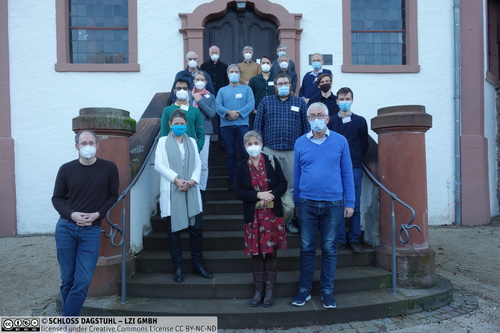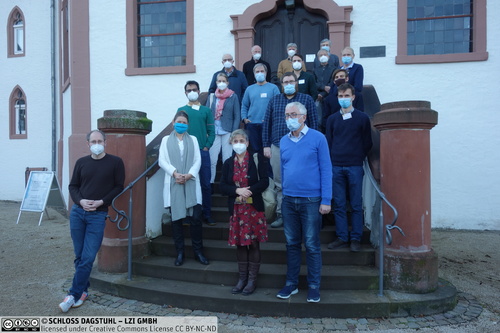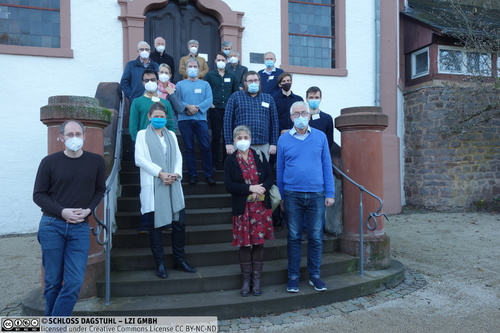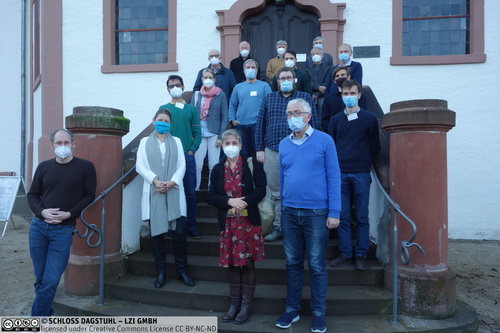Dagstuhl Seminar 21471
Geometric Modeling: Interoperability and New Challenges
( Nov 21 – Nov 26, 2021 )
Permalink
Organizers
- Falai Chen (Univ. of Science & Technology of China - Anhui, CN)
- Tor Dokken (SINTEF - Oslo, NO)
- Géraldine Morin (IRIT - University of Toulouse, FR)
- Tim Strotman (Siemens - Milford, US)
Contact
- Andreas Dolzmann (for scientific matters)
- Jutka Gasiorowski (for administrative matters)
Schedule
The importance of accurate geometric models of shapes, both naturally occurring and man-made, is rapidly growing with the maturing of novel manufacturing technologies and novel analysis technologies. The advent of big data challenges, and the rapid evolution of machine learning serve to confound the issue even more. In the past, Dagstuhl seminars on geometric modeling were focused on basic research. Starting with the 2017 seminar, the focus has been changed to focus on applications of geometric modeling. For this conference we have selected three core application areas that stretch the underlying mathematical underpinnings of the discipline to its limits and beyond:
- Geometric modeling and machine learning (including big data analysis)
- Geometric and physical challenges in additive manufacturing (3D Printing)
- Design optimization
This Dagstuhl Seminar will provide a forum for leading researchers to present new ideas, to exchange scientific insights, and to bring together practical applications and basic research. Except for the 2017 seminar previous seminar explored the theory of shape representations, shape transformations, and computational models for each. This seminar will explore application of this theory to the three above application challenge, strengthening the reliability and performance of applications in engineering, manufacturing, and scientific exploration. The goal of the seminar is to establish a common understanding between the Geometric Modeling research community and the above application fields:
- How to process and analyze huge 3D data sets that may be noisy and incomplete into clean, scalable, and easy to access 3D environments
- How to turn big, dispersed maybe noisy and incomplete geometric data into clean, scalable, and easy to access 3D information that can be used for change detection and decision making
- How to represent, simulate, control, and process complex, anisotropic, internal material enabled by additive manufacturing, and how to design for additive manufacturing
- How to perform topology optimization of internal structure of objects to enable additive manufacturing to reach its full potential
- How to introduce analysis-based design in CAD systems, with isogeometric analysis in mind
To address these questions, we will bring together participants from industry urgently in need of better solutions, researchers in the application areas represented by the three topics, and researchers in the geometric modeling community whose interests align with the three topic areas.
The scientific presentations will be 15 minutes. Senior researchers will give 3 overview talks on the 3 themes of the seminar. We will organize perspective working groups for each of the four topics and ask all participants to sign up for at least one working group. The length of the presentations has been shortened to allow more time for discussion and group dialog. Our goal is for each of the perspective groups to produce a "white paper" for the resulting publication.
 Falai Chen, Tor Dokken, Géraldine Morin, and Tim Strotman
Falai Chen, Tor Dokken, Géraldine Morin, and Tim Strotman
The Dagstuhl seminar, initially planned in May 2020, took place as a hybrid conference in November 2021. Eighteen participants were on site, and thirty three participated remotely out of which five from East Asia and twelve from America.
Due to the pandemic, getting together for a conference has been an important event, and an outstanding exchange time between researchers (compared to a two years pandemic context where interaction has greatly been reduced). In particular, having a significant part of the participants on site has been a real asset compared to the full online conferences. Note also that this has been particularly true for young researchers that are in the process of developing networks and developing collaborations.
48 talks were given including 18 on site and 30 remotely. The program was organized into topics and structured to the extent possible to minimize the challenges posed by the time difference between on-site and remote participants. Speakers from East-Asia were assigned time slots in the morning and speakers from America in the afternoon. The beginning of the afternoon was a privileged time for all participants to meet. The social afternoon was canceled, as it would not have been inclusive for remote participants.
The time freed allowed us to extend the time assigned to topic focused groups sessions. This triggered, under the supervision of five on-site participants, development of topic focused reports. Two of these reports, The Future of CAD (group led by Tom Grandine) and Design Optimization (group led by Konstantinos Gavriil) address the evolution of the application fields in Geometric Modeling, closely linked to its use in Industry. Three other reports on emerging topics have also been based on the group working sessions. Additive Manufacturing (a group led by Sylvain Lefebvre) has been identified as a disruptive technology and has triggered the emergence of new geometric models and materials. Isogeometric Analysis (group led by Carla Manni) addresses how the gap between geometric modeling and simulation can be bridged by replacing the traditional shape functions of Finite Element Analysis by B-splines that cross element boundaries. It thus supplies continuous models connecting the representations of Computer Aided Design and Finite Element Analysis. Geometric Machine Learning (group led by Rene Hiemstra) is a fast evolving domain. Deep learning approaches have already changed the field of Computer Vision, and the contribution into Geometric Modeling is becoming more pregnant. These reports offer to the participants, and beyond, a perspective of the coming challenges in the field of Geometric Modeling.
On top of the communications done in Dagstuhl, a special issue of the journal Graphical Models, has been planned. Submission to the journal is pending.
 Falai Chen, Tor Dokken, and Géraldine Morin
Falai Chen, Tor Dokken, and Géraldine Morin
- Arturs Berzins (SINTEF - Oslo, NO)
- Tor Dokken (SINTEF - Oslo, NO) [dblp]
- Konstantinos Gavriil (SINTEF - Oslo, NO) [dblp]
- Thomas A. Grandine (Seattle, US) [dblp]
- Stefanie Hahmann (INRIA Grenoble Rhône-Alpes, FR) [dblp]
- Rene Hiemstra (Leibniz Universität Hannover, DE) [dblp]
- Bert Jüttler (Johannes Kepler Universität Linz, AT) [dblp]
- Panagiotis Kaklis (The University of Strathclyde - Glasgow, GB) [dblp]
- Rimvydas Krasauskas (Vilnius University, LT) [dblp]
- Sylvain Lefebvre (LORIA & INRIA - Nancy, FR) [dblp]
- Tom Lyche (University of Oslo, NO) [dblp]
- Carla Manni (University of Rome "Tor Vergata", IT) [dblp]
- Géraldine Morin (IRIT - University of Toulouse, FR) [dblp]
- Helmut Pottmann (KAUST - Thuwal, SA) [dblp]
- Ulrich Reif (TU Darmstadt, DE) [dblp]
- Espen Sande (EPFL - Lausanne, CH) [dblp]
- Hendrik Speleers (University of Rome "Tor Vergata", IT) [dblp]
- Deepesh Toshniwal (TU Delft, NL)
- Gudrun Albrecht (Universidad Nacional de Colombia - Medellin, CO) [dblp]
- Falai Chen (Univ. of Science & Technology of China - Anhui, CN) [dblp]
- Ilke Demir (Intel - Hermosa Beach, US) [dblp]
- Nira Dyn (Tel Aviv University, IL) [dblp]
- Gershon Elber (Technion - Haifa, IL) [dblp]
- Carlotta Giannelli (University of Firenze, IT) [dblp]
- Ron Goldman (Rice University - Houston, US) [dblp]
- Hans Hagen (TU Kaiserslautern, DE) [dblp]
- Qi-xing Huang (University of Texas - Austin, US) [dblp]
- Xiaohong Jia (Chinese Academy of Sciences, CN) [dblp]
- Hyunsun Alicia Kim (UC - San Diego, US) [dblp]
- Tae-wan Kim (Seoul National University, KR) [dblp]
- Jiri Kosinka (University of Groningen, NL) [dblp]
- Yang Liu (Microsoft Research - Beijing, CN)
- Nicolas Mellado (CNRS - Toulouse, FR) [dblp]
- Suraj R. Musuvathy (nTopology - New York, US) [dblp]
- Fancesco Patrizi (MPI für Plasmaphysik - Garching, DE)
- Jörg Peters (University of Florida - Gainesville, US) [dblp]
- Konrad Polthier (FU Berlin, DE) [dblp]
- Jeff Poskin (The Boeing Company - Seattle, US) [dblp]
- Xiaoping Qian (University of Wisconsin - Madison, US) [dblp]
- Ernst Rank (TU München, DE)
- Elissa Ross (Metafold 3D - Toronto, CA) [dblp]
- Malcolm A. Sabin (Cambridge, GB) [dblp]
- Péter Salvi (Budapest University of Technology and Economics, HU) [dblp]
- Maria Lucia Sampoli (University of Siena, IT) [dblp]
- Giancarlo Sangalli (University of Pavia, IT) [dblp]
- Hiromasa Suzuki (University of Tokyo, JP) [dblp]
- Tamás Várady (Budapest University of Technology and Economics, HU) [dblp]
- Nelly Villamizar (Swansea University, GB) [dblp]
- Wenping Wang (Texas A&M University - College Station, US) [dblp]
- Juyong Zhang (Univ. of Science & Technology of China - Anhui, CN)
- Yongjie Jessica Zhang (Carnegie Mellon University - Pittsburgh, US) [dblp]
Related Seminars
- Dagstuhl Seminar 9127: Geometric Modelling (1991-07-01 - 1991-07-05) (Details)
- Dagstuhl Seminar 9326: Geometric Modelling (1993-06-28 - 1993-07-02) (Details)
- Dagstuhl Seminar 9622: Geometric Modelling (1996-05-27 - 1996-05-31) (Details)
- Dagstuhl Seminar 99201: Geometric Modelling (1999-05-16 - 1999-05-21) (Details)
- Dagstuhl Seminar 02201: Geometric Modelling (2002-05-12 - 2002-05-17) (Details)
- Dagstuhl Seminar 05221: Geometric Modeling (2005-05-29 - 2005-06-03) (Details)
- Dagstuhl Seminar 08221: Geometric Modeling (2008-05-25 - 2008-05-30) (Details)
- Dagstuhl Seminar 11211: Geometric Modeling (2011-05-22 - 2011-05-27) (Details)
- Dagstuhl Seminar 14221: Geometric Modeling (2014-05-25 - 2014-05-30) (Details)
- Dagstuhl Seminar 17221: Geometric Modelling, Interoperability and New Challenges (2017-05-28 - 2017-06-02) (Details)
- Dagstuhl Seminar 24241: Geometric modeling: Challenges for Additive Manufacturing, Design and Analysis (2024-06-09 - 2024-06-14) (Details)
Classification
- artificial intelligence / robotics
- modelling / simulation
- optimization / scheduling
Keywords
- Geometric modelling
- Shape design
- Geometry
- Computer graphics
- Geometry processing
- Isogeometric analysis
- Artificial Intelligence
- Additive manufacturing
- Design optimization





 Creative Commons BY 3.0 DE
Creative Commons BY 3.0 DE
